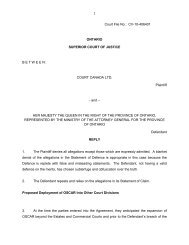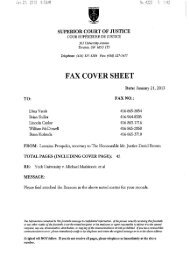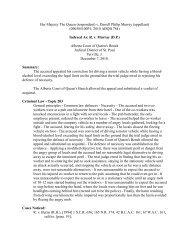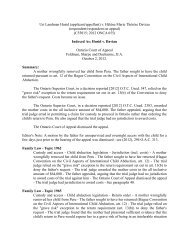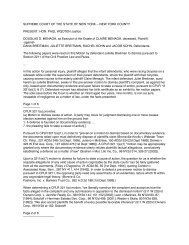A.I. Enterprises Ltd. and Alan Schelew (appellants) v. Bram ... - Slaw
A.I. Enterprises Ltd. and Alan Schelew (appellants) v. Bram ... - Slaw
A.I. Enterprises Ltd. and Alan Schelew (appellants) v. Bram ... - Slaw
You also want an ePaper? Increase the reach of your titles
YUMPU automatically turns print PDFs into web optimized ePapers that Google loves.
defence of justification" - The court elaborated on the defence of justification - Seeparagraphs 23 to 59.Torts - Topic 5023Interference with economic relations - Elements of liability - Use of unlawful means -Three corporations (<strong>Bram</strong> <strong>Enterprises</strong>, Jamb <strong>Enterprises</strong> <strong>and</strong> A.I. <strong>Enterprises</strong>) acquired anapartment building - A "syndication agreement" which regulated the parties' relationshipprovided that if the majority decided to sell, the minority would have the right to purchasethe building at its appraised value, failing which the property could be marketed to thepublic - In April 2000, resolutions were passed calling for the sale of the building - A.I.<strong>Enterprises</strong>, the minority investor, objected, but declined the opportunity to purchase thebuilding at its appraised value of $2.2 million - Nonetheless, <strong>Schelew</strong>, the president <strong>and</strong>sole shareholder of A.I. <strong>Enterprises</strong>, continued to resist any sale on the ostensible ground ofthe majority's non-compliance with the syndication agreement - <strong>Schelew</strong> institutedarbitration proceedings, registered documents encumbering the property's title <strong>and</strong> deniedthird parties access to the building for inspection purposes - During that time, the majorityreceived <strong>and</strong> accepted two offers from distinct purchasers, one for $2.58 million <strong>and</strong> theother for $2.5 million - However, neither transaction closed without either vendor orpurchaser being in breach of the underlying agreement of purchase <strong>and</strong> sale - In 2002, themajority sold the building to A.I. <strong>Enterprises</strong> for its most recent appraised value of $2.2million - The majority investors sued <strong>Schelew</strong> <strong>and</strong> A.I. <strong>Enterprises</strong> for damages equal tothe difference between what the majority would have received, had the property sold to oneof the two prospective purchasers in 2000, <strong>and</strong> the price which the minority paid - Theclaim was allowed - The trial judge concluded that the tort of unlawful interference witheconomic relations had been established - <strong>Schelew</strong> <strong>and</strong> A.I. <strong>Enterprises</strong> appealed - Thedecision in OBG <strong>Ltd</strong>. et al. v. Allan et al. (H.L.) had not been brought to the trial judge'sattention - Applying the definition of "unlawful means" articulated in that case, the<strong>appellants</strong> argued that the appeal had to be allowed as there was no cause of action uponwhich the potential purchasers could have sued either <strong>Schelew</strong> or A.I. <strong>Enterprises</strong> (theindependent actionability requirement) - The New Brunswick Court of Appeal dismissedthe appeal - The court held that the independent actionability requirement should allow forexceptions, or exceptional categories, which were principled in nature <strong>and</strong> this case fellwithin an exceptional category - Although the impugned conduct of <strong>Schelew</strong> <strong>and</strong> A.I.<strong>Enterprises</strong> did not satisfy the requirement of being independently actionable by a thirdparty, the facts of the case were akin to the tort of abuse of process - See paragraphs 6 to 9<strong>and</strong> 78 to 83.Torts - Topic 5023Interference with economic relations - Elements of liability - Use of unlawful means -Three corporations (<strong>Bram</strong> <strong>Enterprises</strong>, Jamb <strong>Enterprises</strong> <strong>and</strong> A.I. <strong>Enterprises</strong>) acquired anapartment building - The trial judge found that the minority investor (A.I. <strong>Enterprises</strong>) <strong>and</strong>its president <strong>and</strong> sole shareholder (<strong>Schelew</strong>) committed the tort of unlawful interferencewith economic relations by their conduct in resisting a sale of the property by the majorityinvestors - The majority investors had received <strong>and</strong> accepted two offers, one fromBloomfield Holdings <strong>Ltd</strong>. for $2.58 million <strong>and</strong> the other from Greenarm Development<strong>Ltd</strong>. for $2.5 million - Both Bloomfield <strong>and</strong> Greenarm had subsequently withdrawn from


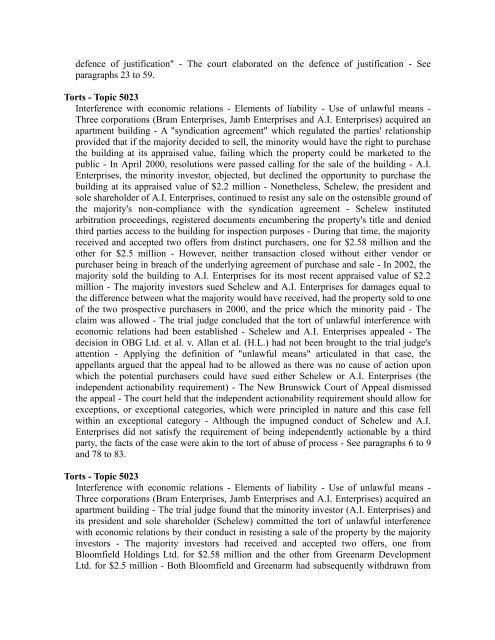
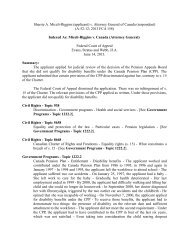
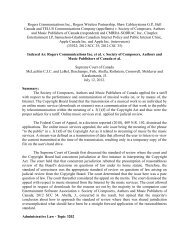
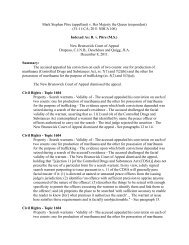
![Jones (appellant) v. Kaney (respondent) ([2011] UKSC 13 ... - Slaw](https://img.yumpu.com/46577625/1/190x245/jones-appellant-v-kaney-respondent-2011-uksc-13-slaw.jpg?quality=85)
